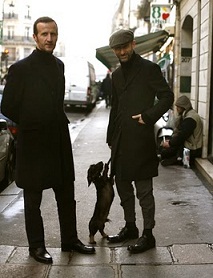Talk like a Parisian
 Sunday, May 9, 2010 at 11:52AM
Sunday, May 9, 2010 at 11:52AM  I’ve come to the conclusion that since the tours created by my company afford visitors a glimpse of Paris that isn’t in the guidebooks, the people I meet are especially curious about French life and culture. As a result, we are often asked what French to learn before coming to Paris.
I’ve come to the conclusion that since the tours created by my company afford visitors a glimpse of Paris that isn’t in the guidebooks, the people I meet are especially curious about French life and culture. As a result, we are often asked what French to learn before coming to Paris.
Of course, it’s unlikely that anyone can actually “learn to speak French” in the course of planning a holiday vacation to France. However, you can use a few commonly known words to your advantage. You just have to use precisely the right word at just the right moment.
The best place to start is to forget everything you think you know. There is a charming term used in French language schools called the “Faux ami” – pronounced Fauze-amie. This translates litteraly to false friend and refers to words that seem like they should mean the same thing in English and French but don’t.
An example is “excusez-moi” which is generally thought by English speakers to work like “excuse me” when it’s closer to “sorry.” “I’m sorry” is actually “Je m’excuse” So this is the first thing to remember. In my opinion you should forget about “excusez-moi”.
If you are in a crowed place or in the Métro and want to get by the thing to say is not "excusez-moi", but “Pardon” pronounced par-DON. With the emphasis on the second syllable and with a nasal “own” sound if you can manage it. When the doors open in a crowded Métro car and you are stuck far from the quickly closing door, saying Pardon firmly and emphatically will part the crowd in seconds.
If you are curious about other ways to attract attention, you can read this post for advice on service in restaurants.
The next thing to learn is when to use the words Bonjour, Bonsoir, Au Revoir and Adieu. “Bonjour” which means “Good Day” is used from morning until dusk. “Bonsoir” is “Good Evening.” Both greetings are used in common speech so there’s no faux-ami lurking here. While there doesn’t seem to be a hard and fast rule about when to switch, it seems that this often happens around dusk I notice it also can happen when you meet someone working in a shop in the late afternoon who has become bored and tired. I think they say Bonsoir out of wishful thinking that their workday is almost over. I would say, it's a safe bet to start using Bonsoir about 6pm. Of course, you will quickly relize that you are using the wrong greeting when you say "bonjour" and the person responds "bonsoir." Note: This only works with native speakers, the rest of us are sometimes as confused as you are.
What about Au revoir and Adieu you ask? Well, just thinking about what each of these words mean will give you a clue when to use them. “Au revoir” translates to “See you again” and “Adieu” is “To God”. Clearly the finality of “To God” makes it something that is not necessarily used when saying “goodbye” to people. The lesson here, unless you are at a funeral, forget Adieu.
 I’ve saved the easiest for last. “Merci” and “Merci beaucoup”. “Thank you” and “Thank you very much” – nothing tricky here. At last -- Something that you can thank Madame Charles, your Junior High School French teacher, for telling you.
I’ve saved the easiest for last. “Merci” and “Merci beaucoup”. “Thank you” and “Thank you very much” – nothing tricky here. At last -- Something that you can thank Madame Charles, your Junior High School French teacher, for telling you.
Now that we’ve reviewed the words, we can now discuss the more challenging part of this effort. When to use the words to get the effect we want -- Like when we need to get people to step aside quickly to let us out of the Métro before the doors shut.
There is a myth that the French are rude, but I think this is no more true in Paris than any other big city in the world. In most cases, this couldn’t be further from the truth. In fact, there are some basic cultural guidelines for being polite to strangers that don't necessicarily apply in English speaking countries.
When you enter a small boutique or a café you are expected to say “Bonjour” (or Bonsoir) to the person working there. Once you have looked around (and regardless of whether you’ve bought anything) one says “Merci – Au Revoir” when leaving. This is also regardless of whether the person in the shop has even bothered to come over and offer to assist you. But I can assure you, no matter how disinterested the person working in the shop may have seemed, when you leave and say “Merci – Au Revoir” they will respond with “Au Revoir.”
The same is true when you leave a neighborhood café. I have already written about how to order coffee in Paris, but after a having a coffee at the counter or a table, when you pass by the bar on your way out the door, you should say “Merci – Au Revoir”. Again, no matter how disinterested the barman may seem they will generally respond with an automatic “Au Revoir.”
The final and perhaps most important moment to use “Bonjour” and “Bonsoir” is when you are asking a question in any store, shop, grocery store or department store. Imagine you have been looking around inside for a little while and now have a question for someone working there. In English, it’s acceptable to glance over and say “Excuse me, do you have this in red?” all in one quick and efficient phrase.
Not so fast there partner, we’re in France; things are different here. I learned this the hard way in the first few weeks of living in Paris back in 2001. Armed with just a couple of weeks of French studies, I went to the Monoprix grocery store in my neighborhood of Passy. I was looking for something that I was sure they stocked but I simply couldn’t find.
I looked around and found a man who was stocking the shelves. I went over to him and said – “Excusez-moi ou est mayonnaise?” -- “Excuse me, where’s the mayonnaise?” Okay, it was a bit roughly said, but I thought I was getting my point across. After all, I'd only been studying French for two weeks. The man responded with a blank stare and replied “Bonjour”. I repeated my question differently assuming I'd made a mistake. “Je cherche mayonnaise” - “I’m looking for mayonnaise”. Again he replied “Bonjour”. The third time I thought I should keep it simplesaying only “Mayonnaise” which I probably pronounced slowly “May-onnnn-NAIZZZZZE” to ensure that I was as clear as possible. By now I became convinced that "Mayonnaise" was not actually a word in French because he responded again with “Bonjour”.
Exasperated, I didn’t know what to do. It was clear that I was not going to be buying any mayonnaise that day. So, I started to walk away. “Monsieur” the man called after me “En France on dit Bonjour d’abord” -- “In France we say Bonjour first”.
Ah, I finally understood, and started over. This time I said “Bonjour”. He replied “Bonjour”, then I said “je cherche mayonnaise” and he replied “Aisle five”. Success! It was my first cultural lesson, and it happened right there in the middle of the Monoprix where I recently had another cultural awakening.
One last moment when I think it’s very important to say Bonjour is on the bus. When boarding the bus, most people greet the driver who says “bonjour” in return. A nice custom I think. In general, when you come up to someone and you want to ask them a question, start with “bonjour” or “bonsoir” and you'll never go wrong.
So, it’s not necessary to learn a lot of French to blend in a bit and give the people you meet in shops and cafés the impression you are making an effort. In reality more and more people speak English in France and so it’s generally not so difficult to communicate in most shopping, eating or sightseeing situations. In most shops even if the person you first greet doesn’t speak English, they will find a colleague who does.
So instead of studying French, I recommend you spend your time reading guidebooks and scouring the internet for places to go, things to see and hidden restaurants to discover. Or, you can let our concierge do the planning for you and simply enjoy the result. Bon voyage!
Thanks to Scott Schuman from sartorialist.com for the images.
